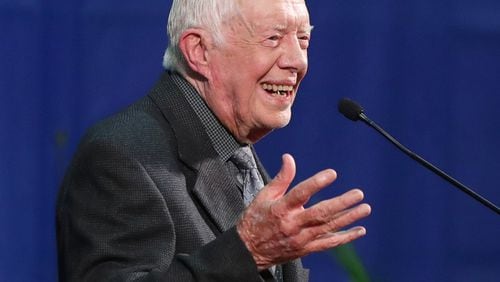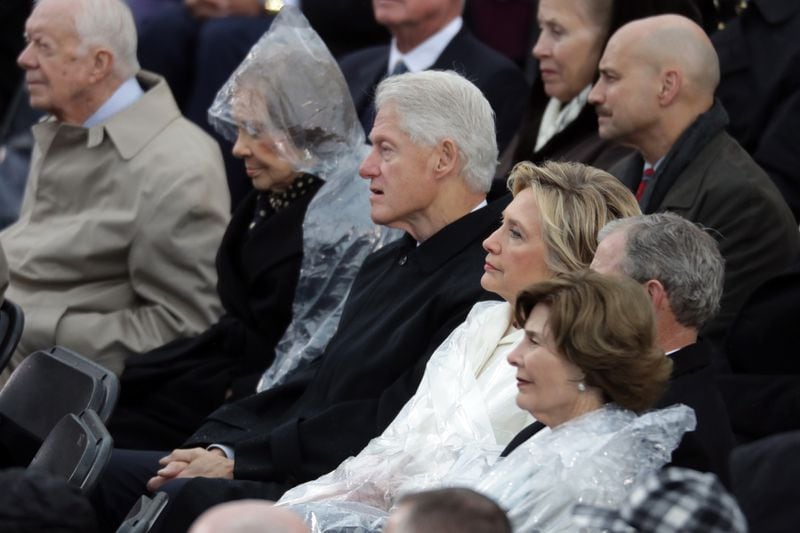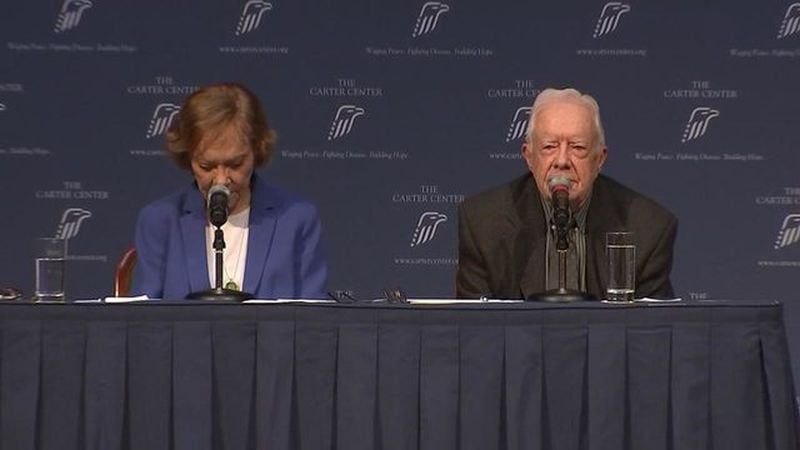Jimmy Carter said Wednesday night that he might not have become president if Twitter had been around back when he was a candidate in the mid-1970s -- but it wouldn’t have been for any lack of trying on his part.
“If it had existed, I would certainly have tried to use it.” Carter, 92, grinned as a crowd of students packed into an Emory University gym burst into applause. “I would have gotten as many (followers) as possible. I would have made my key propositions to the American people during the campaign as clear and as cogent and exciting as I possibly could as I tried to prevail over my opponents.”
Carter’s comment came during his 36th annual Town Hall for first-year students at Emory. In this latest installment of what’s become a cherished rite of fall at the Atlanta university, the former Georgia governor and president showed up at the Woodruff P.E. Center on campus and spent nearly an hour onstage fielding questions from the approximately 1,400 students who filled every inch of the bleachers.
Nor was his social media savvy response the only surprising revelation of the night. When another student asked him what he thought of President Donald Trump’s decision to “end DACA,” Carter, a lifelong Democrat, suggested that the question wasn’t entirely fair to the current Republican occupant of the Oval Office.
“To give Trump some due, he hasn’t ended DACA yet,” Carter said about the policy established by the Obama administration in 2012 that allowed immigrants brought here illegally as children to stay in the country and work and attend school. “What he says is he has given Congress six months to address the issue ... and at the end of that time ‘I will make the decison about DACA.’”
"We don't know for sure whether he's going to say yes or no, because he's said both sides . . . so far," Carter added about Trump, as knowing chuckles rippled across an audience that included Emory officials and other invited guests. "(But) I don't see that it's a hopeless case. I think the pressure and publicity Trump has brought to the immigration issue may have stimulated both Democrats and Republicans in the House and Senate to be more accomodating in this longstanding argument. I hope."
Hope? Please. He turned out to be almost prescient. About an hour after Carter had wrapped up his town hall, news broke that Trump had reached a deal with the leading Democrats in the House and Senate, Nancy Pelosi and Chuck Schumer, to protect young immigrants. The deal reportedly will include increased border security, but no wall -- the very concessions Carter had suggested each party might need to be willing to make.
Credit: Chip Somodevilla
Credit: Chip Somodevilla
The annual Emory Town Hall isn’t open to the public and the pre-submitted questions always are selected at random. The night kicked off with the arrival of Dooley, the top hat-wearing skeletal creature who serves as Emory’s de facto mascot, who shook hands -- twice -- with the former Leader of the Free World. The result was an event with a rather refreshing, “Ask Me Anything,” feel to it.
So much so, in fact, that, Carter -- who’s found himself face-to-face with the leaders of North Korea, Venezuela and numerous other hot spots over the years -- suggested this could be his toughest crowd yet.
“With a great deal of trepidation, I’m going to use most of my time to answer your questions,” Carter quipped after making the briefest of opening remarks.
Spoiler alert: He came through it like a pro. The 15 questions thrown at him ranged from extremely serious to more lighthearted in tone and ran the gamut of topics from transgender rights to peanut butter (Despite coming down on opposite sides of the chunky versus smooth debate, he and his wife, Rosalynn, have managed to stay married for 71 years, Carter joked).
Carter, who also holds the title of University Distinguished Professor at Emory didn’t punt once on a question -- even summoning up his own recent well-publicized medical issues in talking about the benefits of single-payer health care.
Related video
"Theoretically, it's the best system," said Carter, pointing out that it's the system that exists in Canada, where he became dehydrated and nearly passed out during a weeklong Habitat for Humanity building project back in July. "I went to the hospital and they took good care of me and kept me there overnight. When I left the next day, I said, 'How much do I owe you?' (They said) 'Zero.' That was very nice. I think it would work here."
This town hall came one night after the former president and his wife held a similar event at the Carter Center in Atlanta. During“A Conversation with the Carters,” they provided updates on the Carter Center’s work and also answered audience questions. Asked how he would handle the growing nuclear threat of North Korea if he were president now, Carter said he would “I would send my top person to Pyongyang immediately, if I didn’t go myself.”
Also at that Tuesday event, Carter weighed in on a couple of members of Trump’s cabinet, including former Georgia congressman-turned-Health and Human Services secretary Tom Price. Asked about “the emerging anti-vaccine movement in the United States,” Carter brought up the purported causal link between immunization and autism in children.
Credit: � 2017 Cox Media Group.
Credit: � 2017 Cox Media Group.
“That’s been proven to be completely erroneous,” Carter said. “I think the main thing the government could do is have the leaders, including Tom Price and others, announce that this is just a false premise. That there’s no substance to the claim that immunization causes autism.”
Meanwhile, the former president took exception to Education secretary Betsy DeVos’s announcement last week that her department will review Obama-era guidance on campus sexual assault, citing concerns that the current policy denies due process to individuals accused.
“This has been a matter of some concern on a very few campuses,” Carter said about the issue raised by DeVos, before he cited a statistic that one in five girls who enter college in the U.S. are sexually assaulted before they graduate. “I haven’t seen the details of her ruling. But I think shes gone overboard to protect the alleged rapist.”








